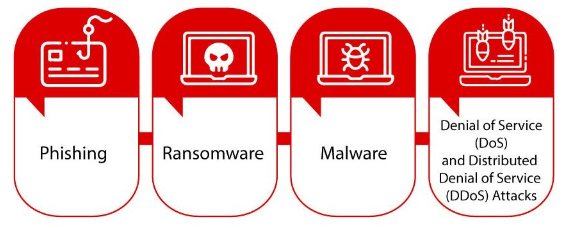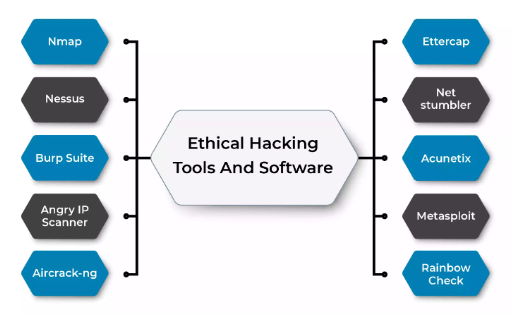
Cyber security and ethical hacking have become paramount to safeguard information, systems, and networks from malicious attacks in a hyper-digitized world. In a world where cyber threats have become so sophisticated and widespread, organizations and governments spend enormous amounts on defensive cybersecurity measures and aggressive approaches like ethical hacking. Therefore, knowing this relationship between these two battle concepts will help portray how the war for digital security is played. This article covers the ongoing battle between Ethical Hacking Course, their workings, how they interact to defend against cyber attacks, and the ethics of using hacking techniques to secure a system.
Want to Earn Your Ethical Hacking Professional Certification? Check Out the Ethical Hacking Training Available at ACTE Now!
Understanding Cybersecurity
Cybersecurity is defined as any activity essential to protect information’s secrecy, integrity, and availability. Cybersecurity is the practice given to protect a computer system, network, or data against attacks, damage, or unauthorized access. It is an extremely broad field involving technology and strategies to combat hacking, data breaches, identity theft, and denial-of-service attacks. It protects both hardware and software like firewalls, encryption, access control, and intrusion detection systems. Cryptography in Cybersecurity plays a vital role in securing communications and data, ensuring that sensitive information remains encrypted and safe from unauthorized access. Essentially, cybersecurity concerns the information’s confidentiality, integrity, and availability, about which much has been said, often relating to the CIA triad. The digital world is constantly changing, and hence, the strategies, methods, and tools cybercriminals use to extract vulnerabilities in systems make advanced security measures necessary for organizations and individuals.
Role of Ethical Hacking in Cybersecurity
Traditional cyber security focuses on the art of defending against threats. Precisely, it focuses on the offensive role of ethical hacking by checking for system weaknesses and vulnerabilities. Ethical hackers, also known as white-hat hackers, are professionals who use their skills to help organizations identify and address vulnerabilities before malicious hackers can exploit them. Unlike black-hat hackers, ethical hackers work within legal and ethical constraints, typically with the permission of the institution being tested. A key security measure that complements ethical hacking efforts is Whitelisting. Unlike hackers, ethical hackers will work within legal and ethical constraints, usually with the institution’s permission under test. They aim to determine vulnerabilities, such as unpatched software, weak passwords, or insecure configurations that a cybercriminal could exploit. Ethical hacking is an indispensable part of an organization’s overall cybersecurity strategy because it helps bolster defences in real attacks.
To Obtain Your Ethical Hacking Certification, Learn from Leading Ethical Hacking Experts and Advance Your Career with ACTE’s Ethical Hacking Training.
Common Cybersecurity Threats
Understanding cybersecurity threats brings understanding how cyber security and ethical hacking work together. There are quite many different forms of cybersecurity threats, but here are a few of the most common ones:

1. Malware Attacks
Malware has always been one of the most common threats to cybersecurity. Viruses, worms, trojans, and spyware are various types of malware that can enter systems to steal data, harm files, or even let attackers take total control over a network. These are spread via email attachments, malicious websites, or infected software. Ethical hackers should know how malware works so that they can create defence mechanisms to detect and neutralize malware before it inflicts damage.
2. Phishing and Social Engineering
In phishing, attackers send a message claiming to be an authentic institution a bank, government agency, or sometimes private company but to steal sensitive information about a victim, such as login credentials or financial accounts. This usually occurs in the context of a fake email, website, or even a phone call. Social engineering attacks sometimes take the form of more advanced tactics, such as pretexting or baiting. Cyber Media is significant in spreading awareness about such threats in today’s digital landscape.
3. Ransomware
This malware locks or encrypts the victim’s files and then demands ransom money in exchange for the decryption of those files. It has recently become very widespread, from individuals to other huge organizations. Possible negative financial and reputational impacts of a successful ransomware attack when sensitive data is stolen or destroyed. Ethical hackers probe the strength of an organization’s systems against ransomware attacks by simulating them while doing penetration tests.
4. Distributed Denial of Service (DDoS) Attacks
Flooding a website or network with too much traffic makes it hard for legitimate users to get access and often causes the system to close down temporarily.
Interplay Between Cybersecurity and Ethical Hacking
The cyberwar is a battle of cooperation. Ethical Hacking Course research the same thing: prevention, detection, and response to cyber threats. Ethical hackers find potential weaknesses in cybersecurity systems.
Cybersecurity practitioners and ethical hackers cooperate for several reasons:
- Proactive Threat Mitigation: Ethical hackers detect vulnerabilities before malicious hackers can exploit them, thus maintaining a proactive defence strategy.
- Testing and Improvement: Ethical hackers conduct penetration testing and vulnerability assessments that help improve security measures by identifying weaknesses.
- Redundancy: Just as firewalls and encryption are basic tools for cybersecurity measures, so is ethical hacking testing whether these defences are effective against evolving attack methods.
In other words, whereas cybersecurity provides the base of protection, ethical hacking always tests and strengthens this base by simulating real-world attacks.
Ready to Master Cyber Security? Explore the Cyber Security Expert Masters Program Training Course Available at ACTE Today!
Tools and Software Used in Ethical Hacking
Ethical hackers use various tools and techniques, such as vulnerability scanners and penetration testing frameworks, to test systems for weaknesses. A key focus is Web Security, as web applications are prime attack targets. By testing for vulnerabilities like SQL injection and XSS, ethical hackers help secure web-based systems against cyber threats.
- Nessus: Developed by Tenable Network Security, Nessus was the world’s most popular vulnerability scanner. This means Nessus is available for DoS attacks and password dictionary attacks in addition to its use for remote vulnerability scans. Closed source, cross-platform, and free for personal use, it is quite effective at identifying grave flaws in any system.
- Burp Suite: The Burp Suite platform allows you to run a web application security test. It is full of hacker tools that work for an entire pen-testing process. A wealth of features are found in Burp Suite, including highly sophisticated and necessary manual tools for web application security assessment. Among them are scan scheduling and repeating, using out-of-band methods, and offering integration with CI.

- Angry IP Scanner: is one of the easiest-to-use ethical hacking tools for scanning IP addresses and ports. It works with Windows, macOS, and Linux and can be used either locally or online. This tool relies on a multithreading strategy for its high speed in scanning operations, starting a new scanning thread for each IP address scanned.
- Aircrackng: WiFi security becomes increasingly important as more users rely on wireless networks. Tools like Aircrack-NG allow ethical hackers to scan and assess WiFi security. Aircrack, a top tool for ethical hacking, helps identify and crack weak wireless connections. Effective Vulnerability Management is key here, continuously identifying and addressing security flaws to prevent unauthorized access and ensure robust protection.
- Ettercap: Ettercap is the name given to Ethernet Capture. It is a network interceptor for LAN networks on cross-platform, free, and open-source platforms that support Windows, Mac OS X, and Linux. Because it is free software, Ettercap is good for developing unique plugins. It consists of network and host investigation tools and supports active and passive dissection.
- Net Stumbler: Using the hacking tool known as NetStumbler, wireless networks on the Windows operating system can be detected. An ethical hacking tool for Windows-based operating systems that is used to prevent wardriving, it is used in identifying the configuration of AP (Access Point) networks, interference source location identification, assessment of signal strength, identifying illegitimate access points, and aiming a directional antenna for long-haul WLAN links.
- Acunetix: Acunetix is a completely automated ethical hacking tool that helps you keep ahead of hostile invaders. He can check every XSS and SQL injection type because the crawler can audit even the most sophisticated authenticated applications that parse HTML, JavaScript, and single applications. Further, it checks management and compliance with details of information about several networks.
- Metasploit: Metasploit is one of the most popular open-source ethical hacking tools widely used by ethical hackers. Metasploit is designed for penetration testing, and ethical hackers can develop and exploit codes against remote targets.
Future of Cybersecurity and Ethical Hacking
Cyber threats are constantly evolving, and so are cybersecurity measures. Automation, AI, and machine learning will enable real-time threat detection. Multi Factor Authentication adds an extra layer of security, requiring multiple identity verifications to prevent unauthorized access. As cyberattacks are gradually becoming sophisticated, finding new vulnerabilities by identifying new security threats and preventing emerging threats will become even more crucial for an ethical hacker. Ethical hacking will increasingly hold the limelight in the rapidly expanding Internet of Things and cloud environments, each of which gives security measures added complexity. At the same time that organizations have been rolling out new technologies, they should ensure that their respective systems are pored over to help curb risks and prevent cyber attacks.
Geared Up for an Ethical Hacking Job Interview? Browse Our Comprehensive Set of Ethical Hacking Interview Question & Answer to Help You Prepare!
Conclusion
The battle between Ethical Hacking Course in a cyber war isn’t easy, but it is necessary for the safety of digital systems and sensitive data. Cybersecurity threats are in a constant state of evolution, and it’s an essential part of always having ethical hackers locate vulnerabilities in the system before cybercriminals can exploit them. This helps cybersecurity professionals and ethical hackers, in conjunction with each other, protect the vast world of digital from rising cyberattacks. The future relevance of cyber security and ethical hacking as technologies advance means that cyber threats will only increase in complexity. This great outcome will thus be realized when cyber security and ethical hacking work hand in hand to make a safer digital environment for individuals and organizations alike to live without fear of malicious attacks.





